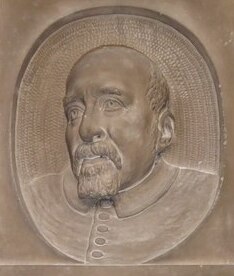Robert Recorde facts for kids
Quick facts for kids
Robert Recorde
|
|
|---|---|

Robert Recorde (c.1512–1558)
|
|
| Born | c. 1512 Tenby, Pembrokeshire, Wales
|
| Died | 1558 London, England
|
| Nationality | Welsh |
| Alma mater | University of Oxford University of Cambridge |
| Known for | Inventing the equals sign (=) |
| Scientific career | |
| Fields | Physician and mathematician |
| Institutions | University of Oxford Royal Mint |
Robert Recorde (c. 1512 – 1558) was a Welsh physician and mathematician. He invented the equals sign (=) and also introduced the pre-existing plus (+) and minus (−) signs to English speakers in 1557.
Biography
Born around 1512, Robert Recorde was the second and last son of Thomas and Rose Recorde of Tenby, Pembrokeshire, in Wales.
Recorde entered the University of Oxford about 1525, and was elected a Fellow of All Souls College there in 1531. Having adopted medicine as a profession, he went to the University of Cambridge to take the degree of M.D. in 1545. He afterwards returned to Oxford, where he publicly taught mathematics, as he had done prior to going to Cambridge. He invented the "equals" sign, which consists of two horizontal parallel lines, stating that no two things can be more equal. It appears that he afterwards went to London, and acted as physician to King Edward VI and to Queen Mary, to whom some of his books are dedicated. He was also controller of the Royal Mint and served as Comptroller of Mines and Monies in Ireland. After being sued for defamation by a political enemy, he was arrested for debt and died in the King's Bench Prison, Southwark, by the middle of June 1558.
See also
 In Spanish: Robert Recorde para niños
In Spanish: Robert Recorde para niños
- Equality
- Equals sign
- Equation
- History of mathematical notation
- St. Mary's Church, Tenby
- The Ground of Arts
- Welsh mathematicians
- Zenzizenzizenzic – a word to describe a number to the eighth power coined by Robert Recorde

